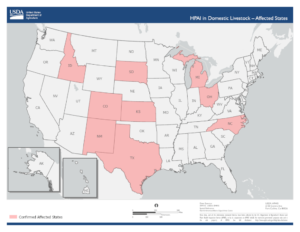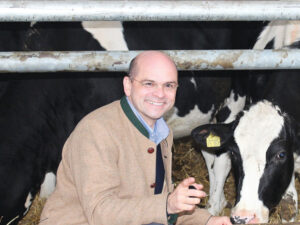
Reuters’ Julie Steenhuysen and Jennifer Rigby reported that “the United States and Europe are taking steps to acquire or manufacture H5N1 bird flu vaccines that could be used to protect at-risk poultry and dairy workers, veterinarians and lab technicians, government officials said, moves influenza experts say could curb the threat of a pandemic.”
“The actions follow the explosive spread of a new strain of bird flu that emerged in late 2020 and has caused unprecedented numbers of deaths among wild birds and domestic poultry and has begun infecting many mammal species,” Steenhuysen and Rigby reported.
Vaccine News Comes After Second US Human Case
The news of the U.S. and Europe prepping vaccines comes after “a second human case of bird flu has been confirmed in the United States since the virus was first detected in dairy cattle in late March, U.S. officials said,” according to reporting from Reuters’ Tom Polansek, Steenhuysen and Leah Douglas in late May.
“The infection of a dairy worker in Michigan expands the outbreak of the virus that has circulated in poultry for years, though the U.S. Centers for Disease Control and Prevention (CDC) said the risk to the general public remains low,” Polansek, Steenhuysen and Douglas reported. “The CDC told reporters on a call it has not seen evidence of human to human transmission of bird flu and that it tested close to 40 people since March, including the Michigan worker. All the people who were tested were connected to or had exposures on a dairy farm, the CDC said. A Texas dairy worker was confirmed to be infected in April.”
In addition to the two human cases, Reuters’ reported that “since 2022, bird flu in the United States has infected over 90 million chickens, more than 9,000 wild birds (and) 52 dairy herds.”
In late April, Reuters’ Manas Mishra and Jasper Ward reported that “the U.S. Food and Drug Administration said on Tuesday that it had found bird flu virus particles in some samples of pasteurized milk, but said commercial milk supply remains safe. The FDA said that because the milk is pasteurized, it remains safe for human consumption as the process kills harmful bacteria and viruses by heating milk to a specific temperature.”
Reuters’ Polansek and Steenhuysen reported in mid-May that “no bird flu virus was found after cooking ground beef to medium to well done, the U.S. Department of Agriculture said in a briefing on Thursday after conducting a study as it addresses concerns over an outbreak of the disease in dairy cattle.”
More on the Vaccines
Steenhuysen and Rigby reported that “Dawn O’Connell of the U.S. Administration for Strategic Preparedness and Response said the government is ‘looking closely’ at the possibility of vaccinating farm workers and others in close contact with the virus. The U.S. has contracts with CSL and GSK to test prepandemic vaccines that more closely match the circulating virus than older H5N1 vaccines in the stockpile. The U.S. is moving forward with the CSL vaccine, a Department of Health and Human Services official confirmed.”
“Discussions about prepandemic vaccine use are going on at government levels and among scientists in a number of places, including in the UK, said Wendy Barclay, chair in influenza virology at University College London, who also researches avian flu for the UK Health Security Agency,” Steenhuysen and Rigby reported. “If deployed strategically to dairy farmers, healthcare workers and those in close contact with infected animals, ‘it would put a pin in the virus,’ she said, although she said it was not clear if this step was necessary yet.”
“The U.S. maintains a stockpile of prepandemic vaccine candidates and bulk vaccine against an array of influenza strains and conducts clinical trials to support an Emergency Use Authorization or FDA license in the event of pandemic,” Steenhuysen and Rigby reported. “Seasonal flu vaccine makers, including Sanofi, could also be asked to shift to producing pandemic flu vaccines. The U.S. is in talks with mRNA vaccine makers Pfizer and Moderna about potential pandemic vaccines.”
“Dr. Richard Webby, a St. Jude Children’s Research Hospital virologist who studies flu in animals and birds for the World Health Organization, said the situation in dairy cattle merits vaccine use,” Steenhuysen and Rigby reported. “‘If we look at the exposure levels that some of these farmers are getting, it’s high,’ Webby said.”






